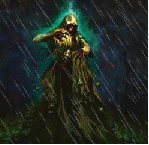|
PureRok posted:Death of the Author is bullshit and just an excuse to see what you want to see. That's all literature is. You read something, you see what you want to see in it, and then you back that up with evidence from the text.
|
|
|
|

|
| # ? Jun 8, 2024 21:39 |
|
PureRok posted:Death of the Author is bullshit and just an excuse to see what you want to see. Gaslighting is bullshit and you made it up because you're crazy.
|
|
|
|
Strobe posted:Authorial intent isn't absolute. If an interpretation can be supported from the text (which is, you know, important to the whole concept. Pulling arbitrary conclusions out of thin air isn't Death of the Author it's just bullshitting) then that interpretation is absolutely a valid one. authorial intent definitely supersedes audience interpretation
|
|
|
|
scary ghost dog posted:authorial intent definitely supersedes audience interpretation Tell that to fans of Fight Club or Scarface
|
|
|
|
Johnny Truant posted:That was easily the worst R&M episode to date, holy poo poo.
|
|
|
|
Bust Rodd posted:Tell that to fans of Fight Club or Scarface I feel like saying people missed the point of Scarface is falling into racist assumptions and not giving them credit. They know how the movie ends.
|
|
|
|
scary ghost dog posted:authorial intent definitely supersedes audience interpretation counterpoint: Ender's Game
|
|
|
|
scary ghost dog posted:authorial intent definitely supersedes audience interpretation of course, and since i didn't intend that to be racist,
|
|
|
|
Ghost Leviathan posted:I feel like saying people missed the point of Scarface is falling into racist assumptions and not giving them credit. They know how the movie ends. Uhhh, dude I’m talking about all the white kids I went to college with, what the gently caress are YOU talking about?
|
|
|
|
scary ghost dog posted:authorial intent definitely supersedes audience interpretation That hasn't been true since before New Criticism took off.
|
|
|
|
Bobbin Threadbare posted:That hasn't been true since before New Criticism took off. theres a lot of leeway in how u can interpret a work of literature, but if the author says its about something specific, then u have to take that into account. its not absolute but its definitely a factor
|
|
|
|
I can’t quite recall or search well enough to find it, but I remember an anecdote where Isaac Asimov enjoyed Tolkien’s metaphor for technology (or something) in his books, which prompted Tolkien to actually respond and say something to the effect of ‘uhhh no I had no deeper meaning in my fantasy novel(s).’ Isaac Asimov, to my recollection, replied like ‘nonetheless, you have still written a book about technology.’ When I think death of the author I think about that probably-apocryphal story. ...That story which, one hopes, has some kernel of truth in it and is not just my brain making stuff up, which brains are liable to do.
|
|
|
|
scary ghost dog posted:theres a lot of leeway in how u can interpret a work of literature, but if the author says its about something specific, then u have to take that into account. its not absolute but its definitely a factor Not if you never watch or read the separate account the author creates. Works can and should stand on their own and not need footnotes to understand, including footnotes written by the authors. You're free to take the author's later interpretation into account as a way to understand and enjoy their work, but you're also free to ignore it or be completely ignorant of this interpretation. That's what "death of the author" means: once a work exists, the author's commentary is neither more nor less valid than anyone else's. E-flat posted:I can’t quite recall or search well enough to find it, but I remember an anecdote where Isaac Asimov enjoyed Tolkien’s metaphor for technology (or something) in his books, which prompted Tolkien to actually respond and say something to the effect of ‘uhhh no I had no deeper meaning in my fantasy novel(s).’ Isaac Asimov, to my recollection, replied like ‘nonetheless, you have still written a book about technology.’ "And when I published an essay in which I maintained that Tolkien's ring symbolized modern technology, and a reader wrote to tell me that Tolkien himself had denied it, I responded with, 'That doesn't matter. The ring nevertheless symbolizes modern technology.'" From the Gold story and essay collection, page 402. Bobbin Threadbare fucked around with this message at 06:31 on Dec 14, 2019 |
|
|
|
Yeah, it's not an "I win" button for one side in an argument, but rather it exists so that no arbitrary "I win" button can be used by either side. The best evidenced argument wins.
|
|
|
|
scary ghost dog posted:theres a lot of leeway in how u can interpret a work of literature, but if the author says its about something specific, then u have to take that into account. its not absolute but its definitely a factor thinking about every other artist i know in different media and how bad they would thrash a dweeb who tells them their intent doesn't matter
|
|
|
|
Sharkopath posted:thinking about every other artist i know in different media and how bad they would thrash a dweeb who tells them their intent doesn't matter I mean, this doesn't necessarily prove anything other than you know some angry people.
|
|
|
|
Authorial intent is useful in analysis of the work and can often inform evaluation and interpretation of a work, but it's not the be-all end-all of critical reading. Authorial intent can depart from the depiction or obvious reads, as much as some reads can depart from the very obvious and clear intent.
|
|
|
|
Most artists and creatives I know are aware of, interested in, and even formally trained/educated about the subjective meaning of art. I've seen people devote whole pieces and art shows to it, in fact. Personally, I think subjective meaning and even concepts like headcanon are pretty unassailable methods and contexts for engaging with creative works. Of course creators try to instill explicit and implicit messages and themes in their art, but, at least in the circles I run in, the idea that art is a conversation is seen as perfectly valid and accepted.
|
|
|
|
Bust Rodd posted:Uhhh, dude I’m talking about all the white kids I went to college with, what the gently caress are YOU talking about? Scarface being famously popular with rappers and black guys? Although basically same principle either way; he reaches dizzying heights of success and goes out in a blaze of glory, far more than most people could ever hope for.
|
|
|
|
if i tried to say that stephen king’s misery is a metaphor for austerity, i might have some solid textual support but that doesnt make my supposition anything more than a thought experiment. ultimately, alternative interpretations of art are less meaningful than surface level readings
|
|
|
|
Sharkopath posted:thinking about every other artist i know in different media and how bad they would thrash a dweeb who tells them their intent doesn't matter Ok but speaking as an artist you can’t really tell someone the way your work makes them feel is wrong.
|
|
|
|
scary ghost dog posted:if i tried to say that stephen king’s misery is a metaphor for austerity, i might have some solid textual support but that doesnt make my supposition anything more than a thought experiment. ultimately, alternative interpretations of art are less meaningful than surface level readings Discussing your metaphorical reading with others could allow them to enjoy Misery on more levels or in different ways than they did before. That's what makes unusual interpretations worth considering and sharing.
|
|
|
|
If you want to do alternative interpretations of film and literature, knock yourself out. Sometimes it's a thought experiment, and sometimes it can lead you to look at things differently in a way you hadn't considered before. However, to dispute the author's word in something like seeing Ralph Ellison's Invisible Man as not being racially relevant, is flat out absurd. Likewise, LoTR is ripe for people to analyze, both within the era it was written as well as Tolkien's own personal opinions, but I've seen people claim it's an allegory for <insert event here> too many times, when such reasoning can be used to claim anything is an allegory, and thus dilutes the work itself. If you want to entertain such a notion, fine, but don't pretend that's the objective meaning here. That kind of thinking can be used to eliminate the concepts of genres and meaning altogether, which might work for some books/film, yet pretending it's universal is meaningless intellectual masturbation, and often only leads to substandard interpretations and criticism.
|
|
|
|
lmao I can't believe that there are literally people who think that the author's word is the be-all-end-all of discussing their work. Do these people watch The Room and not see what the movie is actually about because they think it's about what Tommy Wiseau thinks it's about? That's wild.
|
|
|
|
Not to mention the author may not be being completely honest with themself or the audience when they make a claim about a work’s meaning. A book the author believes or claims to be about class struggle might actually be an expression of the author’s repressed homosexuality or something.
|
|
|
|
Just read whatever you want into whatever you're reading and watching and stop worrying about what other people think it means, because whatever they think is dumb. When I was writing a paper about a short story, and had to find sources other people had written about the short story, I ran into more than a necessary amount of essays about how one throwaway line about a room having a musty smell was actually talking about how vaginas smell weird. You can read whatever you want into things as long as you find a sequence of words in it that sounds like it supports your opinion.
|
|
|
|
Bust Rodd posted:Ok but speaking as an artist you can’t really tell someone the way your work makes them feel is wrong. You can tell them their feeling was based on a misunderstanding/incorrect assumption though.
|
|
|
|
Ghost Leviathan posted:He reaches dizzying heights of success and goes out in a blaze of glory, far more than most people could ever hope for. He doesn't really though, he gets higher up, then fails to go all the way on being a monster coke lord for Sosa, then his entire life shits all over itself, shits on him and he dies miserable and whacked out. "Blaze of glory" has always felt like a real weird way to describe anything to the end of Scarface, the scene gets to be a famous shootbang moment sure, but a lot of the last part of the movie's just Tony's life going down the toilet.
|
|
|
|
i'm pretty sure that there's just different schools of critical analysis that judge the importance of authorial intent differently. death of the author is one (very broad) lens through which a given work can be looked at and analyzed. authorial intent is just gonna matter a different amount to different people the room is a great example of this because while what tommy wisaeu says it's about is is pretty hilarious to anyone who's seen the movie and can clearly see what it's actually about, the more common interpretation of the movie is still a statement on what the author (as in, tommy wisaeu specifically) is thinking and how he personally is showing through in his work (if unintentionally). so, while the uh, exact intentions of the author don't matter, the author very much does in interpreting his work for most people in this case, which is a little different from actual death of the author. ultimately it's all just different perspectives on a work of art and while maybe saying "the author said x so your interpretation is invalid" might be a valid method of judging the value of an interpretation from your perspective, that's also a pretty uninteresting conversation to have. also correctly sussing out authorial intent gets kinda wonky when you're not talking about books or paintings made by a single person and are instead talking about a tv show made by dozens of different people who aren't all named "dan" or "justin"
|
|
|
|
scary ghost dog posted:if i tried to say that stephen king’s misery is a metaphor for austerity, i might have some solid textual support but that doesnt make my supposition anything more than a thought experiment. ultimately, alternative interpretations of art are less meaningful than surface level readings yeah, um, would you have some solid textual support? This is a common criticism of Death of the Author, like, "oh, anything can mean anything so it's all meaningless" - but if you can make the argument from a strong base of support in the text, then it is likely that the points you're raising are actually apparent in the subtext of the work and are, on some level, filtering through to audiences even if they aren't analysing their media intake through the lens of literary theory. Here's a good example: Carol Clover's influential writing on slasher movies. She analysed the psychosexual subtext of movies like Halloween and The Texas Chainsaw Massacre through a feminist psychoanalyst lens, and arrived at some pretty revelatory conclusions about what the audiences of these movies are receiving when they watch them. Her writing codified the phenomenon of the pure, virginal woman being the only survivor at the end of a slasher movie, codified the phenomenon of "teenagers being punished for licentious or sinful behaviour, specifically sexual behaviour, especially women" in slasher movies, and identified how the early slashers were at least in part vicarious, challenging audience identification figures who existed to enact violent punishment upon straying women. This stuff is all there in the subtext of those movies, but it is also a large part of what audiences are getting out of them, even if they don't consciously process it like that. They had huge appeal because of their psychosexual subtext and the ways in which it re-enacted and enlarged social hangups about gender, morality and sexuality. You can't divorce the surface reading ("a man in a mask stabs attractive young women who have just had sex and they die while moaning") from the subtext ("this is about being afraid of and/or punishing people for having sex"). The viewing audience may not consciously realise what they're taking in while they watch that, or why it appeals to them, but they carry it away with them regardless. Likewise, the directors of those movies were in most cases not thinking, "let's make a moralistic horror flick about how women who gently caress should be punished with metaphorical rape by knife, while virginal women escape the killer due to their sexual purity. It'll be an allegory for how abstinence is best!". They just knew which ideas were scary and compelling, either to them or to audiences, and reproduced those ideas because they knew they were appealing. The lit crit reading is the only way to unpick these films, and is massively revelatory about why those films were phenomenally popular with audiences. Going to the well of creator's intent is (as in many cases) functionally valueless, because they were often just performing a cargo cult recreation of motifs that they knew provoked certain feelings without being entirely aware of why. This same phenomenon occurs in all sorts of media. Very often creators will stuff their work with detailed allegorical subtext that has its roots in social norms, unthinking reproduction of previous cultural artefacts, or psychological baggage on the part of the creator, without having any idea that they have done so. At other times, they'll attempt to write a story about something and wind up writing it about something else - see Ray Bradbury's splenetic insistence that Fahrenheit 451 is not about the danger of destroying knowledge and facilitating authoritarian social control by burning books, but is actually about the danger of advanced technology making us numb to trauma. The author's statement of intent can be instructive, but it is never the last word. In the case of a lot of popular media, especially that which is cynically churned out to fit a template of "what works with audiences right now", the author's intent isn't even the first word, because they're only repeating surface level patterns they know are successful without having any idea of the subtext that makes those patterns appealing.
|
|
|
|
galagazombie posted:You can tell them their feeling was based on a misunderstanding/incorrect assumption though. Ok so like what if the Mona Lisa was actually just Da Vinci being “look at this goofy lady’s dorky smile, can you believe this poo poo?” Like this idea basically asserts that once the author is dead/otherwise inaccessible to beholder/consumer, their creation is basically doomed to being eternally misinterpreted and misunderstood. The reasons and motivations for making a thing don’t always link up with the reasons and motivations people have for enjoying something. Also sometimes people gently caress their own creations up. George Lucas and J.K. Rowling are great examples of people who seem to genuinely not understand what people enjoyed about their original works and their continued insistence that they DO just made things shittier and shittier. Are you saying everyone who was disappointed by the prequels just doesn’t ‘get’ Star Wars?
|
|
|
|
Bust Rodd posted:Ok but speaking as an artist you can’t really tell someone the way your work makes them feel is wrong. Real artists are powerful and emotional brutes and we should do everything possible to placate and soothe them lest they turn their tremendous capacity for violence against us.
|
|
|
|
You’re maybe joking but historically you would probably weep if you really sat down and examined how many of History’s greatest atrocities had been committed by failed artists
|
|
|
|
Bust Rodd posted:You’re maybe joking but historically you would probably weep if you really sat down and examined how many of History’s greatest atrocities had been committed by failed artists It takes two things to become an artist: A sacrifice of your own blood and two operational kills pure and righteous in the eyes of The Lord. To be anything lesser is to wear the appellation falsely.
|
|
|
|
"Dragons are for nerds who don't want to admit they're christian" is such a deep cut against Jordan Peterson fans, and I love that the show is just openly hostile to the alt-right-adjacent aspect of its fans.
|
|
|
|
It's been said better above but yeah, the author's intent is absolutely external to the text and cannot be read to be part of the text. If the author is vanished and their name erased from history, the text remains. Shakespeare's intent matters to the interpretation of his work as little as the question of his existence does. The work still exists and we're still able to read it. Without this fundamental truth it becomes impossible to do (eg) political readings of texts that aren't overtly claiming a position. The slavery angles in Harry Potter are an example, albeit a tired one. Are we to believe JK Rowling's insistence that the elves are inherently servile or are we to examine the work as a product of its broader cultural context? Does James Bond have anything to say about British imperial foreign policy or is it just a rad dude shooting wily foreigners and claiming his prize in women (remember, he's good whether you like him or not. Fleming said so). If I'm remembering right this particular angle is what derrida was getting at in Plato's Pharmacy when he talks of texts as orphans that slay their own parents. Once a work is out it's speaking for itself and you can't unfuck that mammoth. So the text stands alone as an object that can only speak for itself, but of course we read it in relation to its context and in light of that you can absolutely bring authorial intent to bear on the reading as a part of context. There's no justification, however, for trusting that voice when you know from close reading that it's speaking against a fully reasoned meaning that you draw from it (because meaning occurs in the reader. The text is just an inert object, it doesn't mean anything until it's acted upon.) This standalone-in-context position is the point of the double meaning in "there is nothing outside the text/there is no outside the text". But you always have to be rigorous if you're making a wild claim. You can't just spin bullshit from nothing. Also just read the loving essay a few times if you haven't, it's short and free on the internet. It'll help you understand the concept and also the historical moment Barthes was writing in, when critics were using a biographical approach to criticism that led to way more dogshit bad faith spurious readings than the fictional threat of subjectivism ever did. Dick Swiveller fucked around with this message at 15:28 on Dec 14, 2019 |
|
|
|
Open Source Idiom posted:I mean, this doesn't necessarily prove anything other than you know some angry people. I think in the dark days to come having lots of angry friends is more of a boon than you are crediting it for.
|
|
|
|
Shitenshi posted:If you want to do alternative interpretations of film and literature, knock yourself out. Sometimes it's a thought experiment, and sometimes it can lead you to look at things differently in a way you hadn't considered before. However, to dispute the author's word in something like seeing Ralph Ellison's Invisible Man as not being racially relevant, is flat out absurd. Likewise, LoTR is ripe for people to analyze, both within the era it was written as well as Tolkien's own personal opinions, but I've seen people claim it's an allegory for <insert event here> too many times, when such reasoning can be used to claim anything is an allegory, and thus dilutes the work itself. If you want to entertain such a notion, fine, but don't pretend that's the objective meaning here. That kind of thinking can be used to eliminate the concepts of genres and meaning altogether, which might work for some books/film, yet pretending it's universal is meaningless intellectual masturbation, and often only leads to substandard interpretations and criticism. To ignore the racism of Invisible Man is to ignore the text itself. The author is alive when writing the text but dead when providing extra commentary afterwards. And as I said earlier, Death of the Author isn't a recommended critical method so much as it is a description of what happens regardless: when people consume a work, they get different interpretations from it because they led different lives. Some will get all the allusions to earlier works the author inserted while others will encounter these situations for the first time. For instance, when I first read Invisible Man I wasn't aware of what Little Sambo was, and so the protagonist's violent reaction to the doll took me by surprise. My understanding of the book may have been incomplete because of this lack of knowledge, but that does not make my reading experience less valid. In fact, it allowed me to discover what Little Sambo means through the context of the scene. Death of the Author is the acknowledgement that the audience is bringing something to the text and will use that something to interpret it in ways the author couldn't have imagined. Art is a conversation, and sometimes things are both lost and gained in the translation between author and audience.
|
|
|
|
I disagree with the idea that the author's intention is the objective truth of the work. "Roxanne" is a timeless boomer love song, even though Sting literally wrote it about a stalker.
|
|
|
|

|
| # ? Jun 8, 2024 21:39 |
|
I have nothing of value to add to this conversation except that it brought up a memory from LONG AGO where we read a short story in class and it had a random person on the road who helped with a flat tire or something really mundane, and then the teacher went on like an hour long IT WAS JESUS rant and goddamn did that turn me into an ardent AUTHORIAL INTENT IS THE ONLY THING THAT MATTERS person for a long time. and then, Ender's Game swung me right back around the other direction.
|
|
|



























